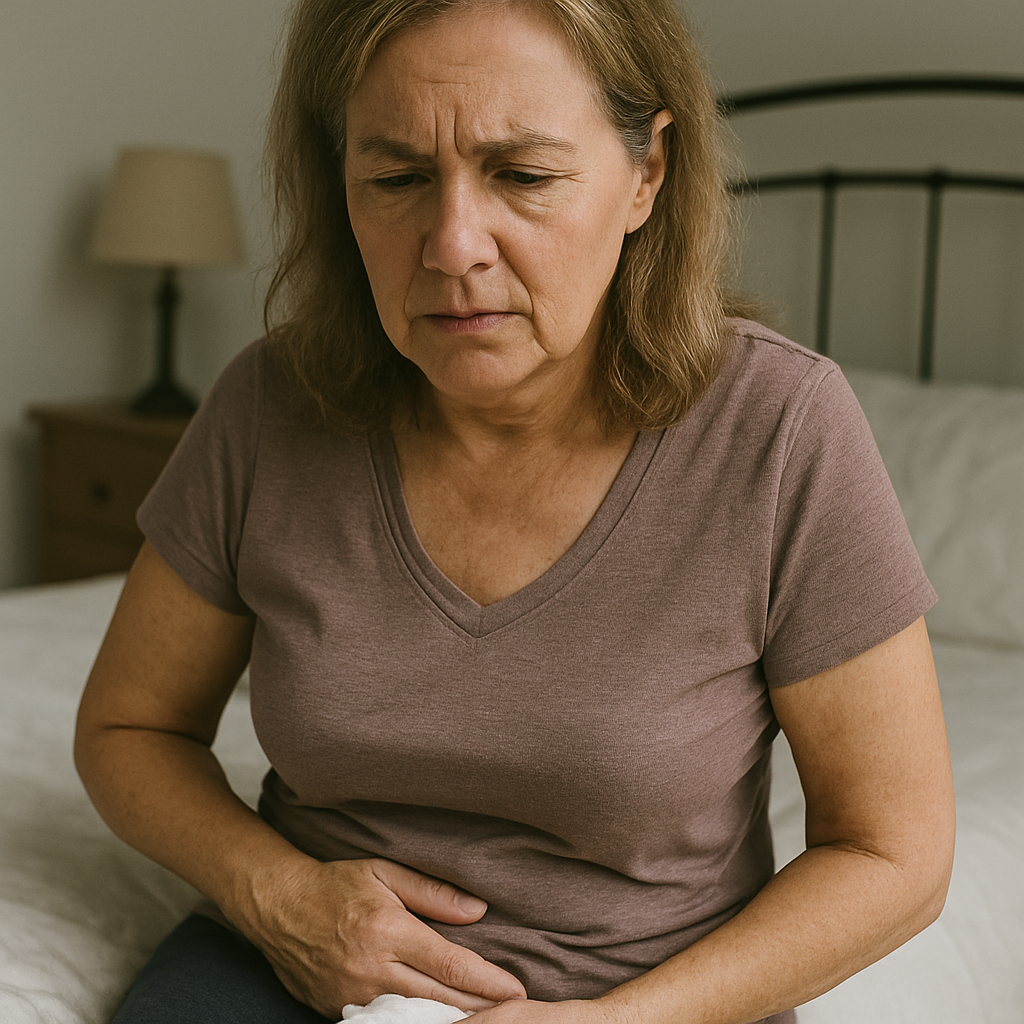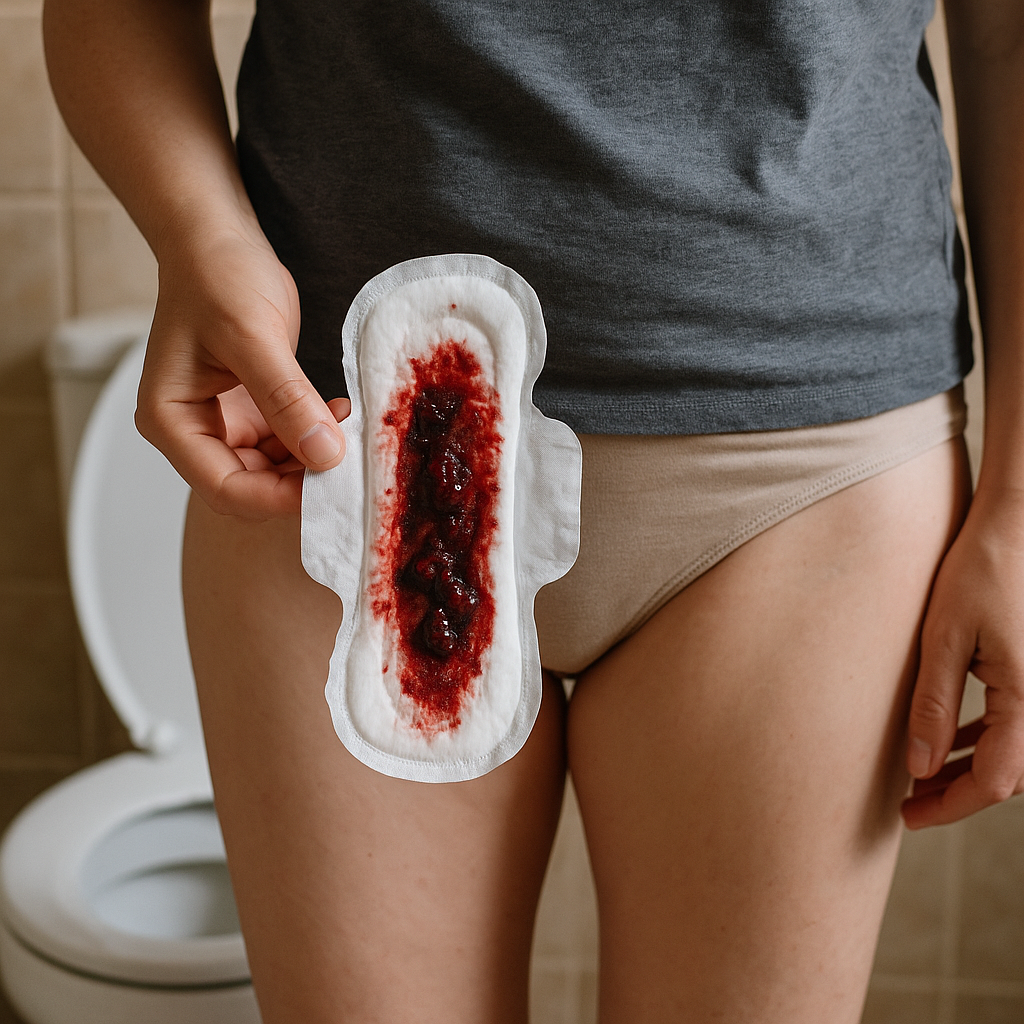How to Stop Heavy Bleeding During Menopause Naturally

If you’re over 40 and suddenly dealing with heavy periods with clots — or worse, huge period clots — you’re definitely not alone. It's jarring. You go from regular cycles to needing to carry an extra pair of pants everywhere. What gives? Perimenopause often sneaks in with a suitcase full of symptoms, and heavy menstrual bleeding with clots is one of the loudest of them. Fortunately, there are ways to slow down or even stop heavy bleeding during menopause naturally, without resorting to drastic medical interventions.
This article digs deep into what’s really going on inside your body, what those heavy clots mean, and — most importantly — how to stop heavy menstrual bleeding with clots using home remedies, herbs, and lifestyle tweaks that have helped thousands of women regain control. This isn’t about quick fixes. It’s about real, practical steps you can actually do (like, today) to feel better fast.
Heavy Periods After 40 with Clots: What’s Happening?
It feels like your body flipped a switch. One minute, your period was fine. The next, you’re bleeding so much you’re wondering if this is normal — and how long you can go on like this.
Signs of Perimenopause and Hormonal Imbalance
Welcome to perimenopause — that tricky in-between phase before actual menopause hits. Estrogen levels begin to rise and fall unpredictably, while progesterone takes a back seat. This hormonal seesaw can lead to heavy periods after 40 with clots, cramps that feel like they’re from a horror movie, and cycles that show up whenever they please.
It's not just hormones, though. Fibroids, thyroid imbalances, and uterine polyps can all play a role. But if your periods have gotten way heavier and you’re spotting heavy clots during your period, especially blood clots larger than a quarter, it’s time to look into both causes and solutions.
When Clots Become a Concern
Not all clots are cause for panic — the uterus naturally sheds tissue. But perimenopause blood clots that are unusually large, frequent, or accompanied by severe fatigue and dizziness might signal excessive blood loss or underlying conditions.
Some women describe huge period clots that feel like “mini-liver chunks” (yes, gross — but real). These can lead to anemia, disrupt your day, and leave you feeling completely wiped out. If that’s you, hang tight. There’s a lot you can do — right at home — to take back control.

Don't wait or self medicate. Start chat with Doctor NOW
How to Stop Heavy Menstrual Bleeding with Clots Naturally
Okay, here’s the part that matters most. If you’re bleeding like crazy, popping ibuprofen like candy, and wondering if this is just your new normal — don’t worry. There are natural remedies to stop period bleeding or at least reduce it significantly.
Ayurvedic Herbs to Manage Bleeding and Hormones
Ancient doesn’t mean outdated. Ayurvedic herbs like ashoka, lodhra, and shatavari have been used for centuries to support uterine health and balance hormones. These herbs are known to reduce heavy menstrual bleeding with clots, ease cramps, and regulate cycles naturally.
Also consider yarrow, shepherd’s purse, and raspberry leaf tea — all used traditionally to ease bleeding. They might not work overnight, but when used consistently, they can help your body return to balance.
Natural Remedies to Stop Period at Home
Want to try something simple first? Here are a few home remedies to stop period bleeding:
-
Cold compresses on the lower abdomen: Helps constrict blood vessels and slow bleeding.
-
Hydration + electrolytes: Sounds basic, but staying hydrated helps thin the blood and keep things moving properly.
-
Blackstrap molasses: It’s rich in iron and can support blood production if you’re already feeling weak.
Perimenopause Clots and Heavy Bleeding: Causes and Relief
Dealing with perimenopause heavy bleeding clots can feel like living with an unpredictable roommate — you never know what you’re going to get each month. One cycle is light, the next leaves you changing pads every hour and wondering if something’s wrong. Spoiler: you’re not alone, and yes, there are solid explanations (and solutions).
Large Blood Clots During Perimenopause Explained
Let’s be honest: seeing large blood clots during perimenopause can be unsettling. These clots aren’t just annoying — they’re often a sign that your uterine lining is building up too thick between periods. Then, when your body finally gets the signal to shed, it does so all at once — resulting in huge period clots that might feel like you're losing half your body's blood (you’re not, but it feels that way).
Progesterone usually keeps estrogen in check and tells your body when it’s time to clean house. But during perimenopause, when progesterone dips and estrogen runs the show, your uterine lining can grow more than usual. That’s where the heavy periods with clots come in.
Fibroids or adenomyosis can also be at play — both are common in your 40s and tend to make periods heavier and more clot-filled. If you’ve been told “it’s normal,” but you’re missing work, skipping outings, or feeling completely drained after every cycle, that’s a sign it’s time to take action — even if it’s just on the natural front first.
Diet, Rest, and Lifestyle to Ease Flow
Sometimes it’s the simplest things that make the biggest impact. Managing perimenopause clots isn’t always about expensive supplements or intense routines. Think balance — especially in your daily lifestyle.
-
Iron-rich foods like lentils, spinach, red meat, and pumpkin seeds help replace lost nutrients and support blood production.
-
Anti-inflammatory foods — turmeric, ginger, berries — can help ease uterine inflammation and slow down the flood.
-
Avoid caffeine and alcohol during your period if possible. They can increase prostaglandins (those pain-triggering compounds) and make bleeding worse.
-
Rest. Please. Skipping sleep or pushing through fatigue can mess with your cortisol levels and indirectly affect your hormones. Plus, you deserve to rest.
One more thing? Stress is a hormone disruptor in disguise. Chronic stress can make estrogen dominance worse, prolonging bleeding or even delaying ovulation — which just means heavier bleeding later. Not fair, right?

Home Remedies to Stop Period and Support Menopausal Transition
Now that we’ve talked symptoms and causes, let’s jump into what helps. You don't need to overhaul your life overnight, but adding just one or two of these natural remedies to stop period bleeding can be a good start.
Cooling Foods and Spices for Balance
In traditional medicine, menopause and perimenopause are viewed as “heating” stages. Your body is going through transformation, and internal heat rises — literally and metaphorically. Eating cooling foods can help balance things out.
-
Cucumber, watermelon, mint, coconut water, and aloe vera juice — all help cool the body and ease internal inflammation.
-
Spices like fennel, coriander, and cardamom are gentler on the system than chili or pepper and support hormonal calm.
It's honestly kind of wild how food can influence flow. But it does — more than we usually realize.
Daily Routine Tips to Regulate Excess Bleeding
Having a solid daily routine can work wonders for hormone regulation:
-
Go to bed at the same time every night (easier said than done, we know)
-
Gentle movement like yoga or walking — especially during your period
-
Keep your gut healthy — digestion and estrogen metabolism go hand in hand
-
Track your cycle, even if it’s irregular. Patterns start to emerge over time
This stuff may not seem like it’ll stop heavy menstrual bleeding with clots overnight — but give it a cycle or two. Many women see significant changes just by tuning in and staying consistent.
Conclusion
Navigating the chaos of perimenopause clots and heavy bleeding is no small feat. One month, you’re just spotting. The next? You're wondering if you should keep an emergency kit in your car. But here's the thing: you don’t have to “just deal with it.” There are ways to support your body through this phase — naturally and effectively.
From home remedies to stop period flow, to herbs and lifestyle shifts that promote hormone harmony, you have options. You don’t need to suffer in silence or jump straight to invasive procedures. Sometimes, it’s about small consistent steps — like sipping herbal teas, cutting down on inflammatory foods, or simply resting when your body screams for it.
And remember: every woman’s journey through menopause is different. What works for your best friend might not do a thing for you — and that’s okay. Keep tuning in to your body. Track your symptoms. Be gentle with yourself.
Heavy bleeding, large blood clots during perimenopause, and unpredictable cycles aren’t just “part of getting older.” They’re signals. Your body is communicating with you. Listen closely, respond with care — and don’t be afraid to get support when you need it.
If you found this helpful, please share it with a friend, sister, coworker — anyone who’s also going through the rollercoaster. Let’s stop whispering about menopause and start talking openly. Honestly. Like humans.
FAQs
Which fruit stops heavy bleeding?
Great question. Fruits high in vitamin C can help reduce heavy bleeding by strengthening blood vessels and aiding iron absorption. Think oranges, papaya, kiwi, and berries. Papaya in particular has enzymes that support uterine tone — many traditional medicine systems recommend it for regulating flow. Also, bananas (though not technically a bleeding-stopper) help replenish potassium lost during heavy cycles.
But just a note: if you're already bleeding a lot, fruit alone probably won't stop it completely. It’s more about using the right combo of diet, herbs, and rest.
What should I drink when I bleed a lot?
Start with hydration. When you're bleeding heavily, you're losing fluids — so replacing them is key. Coconut water is great for replenishing electrolytes, while beetroot juice supports blood production (plus it's tasty). Herbal teas like:
-
Nettle tea — full of iron and vitamin K
-
Yarrow tea — known to help reduce menstrual flow
-
Shepherd's purse — an astringent herb often used for uterine bleeding
Avoid alcohol and too much caffeine (sorry, I know), as they can widen blood vessels and make bleeding worse.
One weird but helpful tip? A pinch of sea salt in warm lemon water can help maintain sodium levels and hydration when bleeding heavily. Sounds gross. Actually works.
Final Words
If you’ve been struggling with heavy periods after 40 with clots, huge period clots, or just wondering if your experience is normal — yes, it’s common, but that doesn't mean it's something you need to just live with.
You now know how to stop heavy bleeding during menopause naturally, and you're armed with practical tools, insight, and options. Try one new remedy this week. See how your body responds. Keep going.
And if this article helped, even just a little? Pass it on. Let’s build a world where women don’t have to Google symptoms in the dark. Where we talk openly about perimenopause clots, hormonal chaos, and everything in between.
Your body’s changing — but that doesn’t mean you have to lose control.
Got any more questions?
Ask Ayurvedic doctor a question and get a consultation online on the problem of your concern in a free or paid mode.
More than 2,000 experienced doctors work and wait for your questions on our site and help users to solve their health problems every day.

